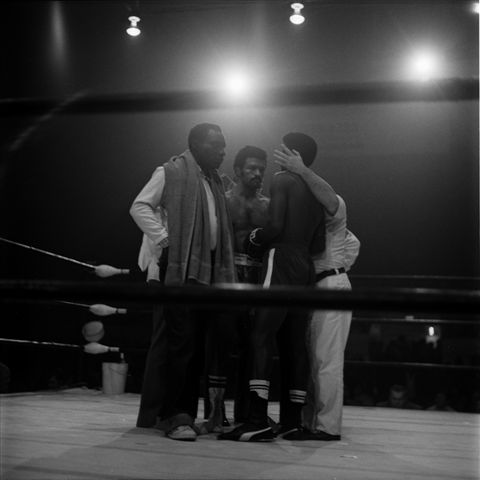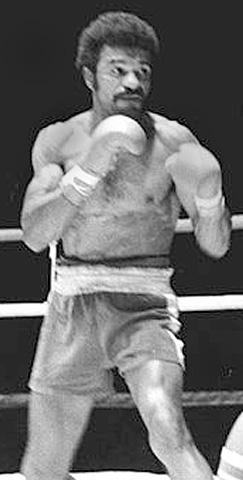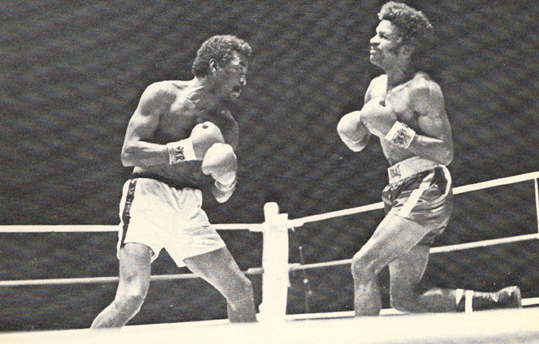February 2006
Rinsing Off the Mouthpiece
By GorDoom
Poem of the Month
By Tom Smario
The 2005 CBZ Year-End Awards
By J.D. Vena
Women to Watch For in 2006
By Adam
Pollack
INTERVIEWS:
Lou DiBella: No Joe Palooka
By Dave Iamaele
Lamon Brewster, Unplugged
By Juan C.
Ayllon
Touching Gloves with...
Clyde Gray
By Dan
Hanley
PROFILES:
Iron Mike Tyson: Myth or Monster?
By
Jim Trunzo
Jess Sandoval: The Coach Says,
"Bundle Up"
By
Katherine Dunn
The Legend of the Cuban Baron,
Ramon Castillo
By Enrique Encinsoa
Paul Thorn
By Pete Ehrman
Battling Nelson: Always Battered,
Seldom Beaten
By Tracy Callis
Kid Chocolate,
the Cuban Bon Bon
By Monte Cox
BOOK REVIEWS AND EXCERPTS:
Shadow Boxers
Photographs by Jim
Lommasson
The Iceman Diaries
by John Scully
The Boxing Bookshelf
by Dave Iamele
|

Touching Gloves
With...Clyde Gray
By Dan Hanley
Clyde Gray really takes me back. He fought in a simpler time where a fighter gave his all
before a rabid crowd and expected nothing in return apart from a piece of the gate and a
little adulation that his fists had earned. While suffering the eternal optimism of
fighting for a dreamlike title, which appears lost amid the multifight contracts of today,
Clyde Gray takes it all in stride.
DAN HANLEY: Clyde, where are you from originally?
CLYDE GRAY: Originally
I'm from Nova Scotia.
And how, in that hockey-mad country of yours, did you get steered into boxing?
Well, my older brother Stewart got into boxing and drew me into it.
Stewart Gray was your brother?
That's right -- Stu, we called him, got me
started with Bev Carter at the Landsdowne Boxing Club in Nova Scotia. He too went pro but,
unfortunately, passed away from injuries sustained against Al Sparks for the Canadian
light-heavyweight title.
That is a shame. The downside to our sport.
But that happened much later. To
answer your question, I had about 35 amateur bouts with Landsdowne BC.
How did you fare?
I did all right, but the problem with amateur boxing in
Canada was that it wasn't supported. I think we only sent like two fighters to the
Olympics in '68.
In '68, the year you went pro, who did you sign on with?
Well, Irv Ungerman from Toronto managed my brother, who wanted to return to Nova Scotia.
So I came in sort of as a replacement and stayed with him my entire career.
And your trainers?
At first Teddy McWhortle, and then eventually Lee Black.
You rattled off 20 straight wins before taking on your first name opponent nationally.
You took on the patriarch of the Hilton clan. Tell me about your fight with Davy Hilton
Sr.
Well, Davy was a good puncher, but I was on the way up and he was on the way
down, which happens a lot in boxing. I didn't have much trouble with him, beating him over
10.
Right after the Hilton fight, you came into my stomping grounds in Chicago and lost to
the veteran Eddie Perkins. In hindsight, do you think you took on more than you could chew
at that time in your career?
Maybe, but I knew who Eddie Perkins was, just had never
seen him fight. He wasn't much of a puncher, but I tell you, he was nearly impossible to
hit.
You got back on track, and less than a year later you were fighting the Canadian
welterweight champion, Donato Paduano, for the title. You had about identical records. He
had only lost to Ken Buchanan, and you were fighting in his neck of the woods in
Montreal.
That's right, the Montreal Forum, and he was very popular there. Y'know,
while training for that fight, a friend of mine, Roy Hamilton, came to camp and handed me
a film reel and said, "This is the way you have to fight Paduano!" And we sat down and
watched an old fight of Henry Armstrong. And that's the way I beat him -- I swarmed.
 I always felt you could do a little of everything. Did you alight on any certain
style?
I always felt you could do a little of everything. Did you alight on any certain
style?
Well...Bev Carter taught me to box, Teddy McWhortle would teach pressure.
Me, I would adapt to the opponent in front of me.
With the Canadian belt around your waist, you headed off to Long Beach, California, to
lock horns with Armando Muniz for the vacant NABF Welterweight title. Tell me about that
fight.
Y'know, I should have taken that fight. Muniz was a good puncher, but I got
off to a good start, had him cut, but around the fourth or fifth round my glove split. By
the time it was replaced I had cooled off and was stopped in nine.
I recall a real delay. I remember the announcers saying, "Why is Gray insisting on a
brand-new glove rather than an available glove that's already been broken in?"
That must've been my manager. I didn't even know about that.
You went on an 11-bout unbeaten streak, beating good fighters like Marcel Cerdan Jr.,
Manny Gonzalez, and Eddie Blay for the Commonwealth title when you took on an all-time
great in Toronto for the world welterweight title. Tell me about your fight with Jose
Napoles.
What I remember most is the plan mapped out for me. Napoles was known for
a wicked left hook, so they had me circling to his right. This was fine, but I was
concentrating so much on strategy rather than fighting that the fight was slipping away.
By the time I turned it on, the fight was gone.
I remember in the 15th you jarred him a couple of times with overhand rights. Too
little, too late, I guess. As I recall, they tried something rather novel in that fight:
It was the first time posting scores after every round was employed.
That's right, which wasn't a good move. Our own judge, Tony Canzano, had it wider for
Napoles than the other two officials. The crowd was going crazy looking at those scores.
You went on another streak after that, winning nine straight, including wins over Bunny
Grant and Gil King, when Napoles was stripped of his title by the WBA and you were matched
up with Angel Espada for the vacant title.
Y'know, Dan, I have a very good copy of
that fight, and every time I see it I think, if that fight took place in Toronto rather
than San Juan, I would have got the decision. Espada was a good boxer but I was winning
easily until I got cut, then he turned into a tiger.
You were starting to get more cut-prone at this time, weren't you?
Oh, yeah!
Y'know, I was never cut as an amateur, but the long, hard pro career was taking a toll.
After the Espada fight you went on another streak -- which is also why you were never
out of the Ring ratings throughout the '70s -- before signing for your third shot
at the title in '77 against Pipino Cuevas. Tell me about that fight.
Well, there's not much to tell [laughs]. That fight took place in Los Angeles, and
just before the fight started I looked over at my wife at ringside, and she looked
frightened to death. I believe it really rattled me, because he hit me with something so
quick into the fight. He really had terrible power. I thought Tommy Hearns hit hard, but
Cuevas...wow!
At the age of 30 with 65 fights and three title shots behind you, it was looking like
your best days were done. However, you were racking up quite a few Commonwealth title
defenses. Was the Commonwealth title fairly lucrative?
Oh, yeah! I was making
$25,000 to $30,000 a defense. I even once made $20,000 for a Canadian title defense.
What was your biggest purse?
$75,000 for the Pipino Cuevas fight. But when I
think of the millions fighters today make, I can recall when I fought Jose Napoles, he
made $120,000 for that fight. Can you imagine by today's standards, paying a fighter like
Jose Napoles $120,000?
A couple of bouts I was always curious about took place over in Fiji in '78. You
defended your Commonwealth title against Sakaraia Ve. You stopped him in eight rounds and
then gave him an immediate rematch, in which you again stopped him in eight. Why the
rematch? Was the first fight that close that warranted a rematch?
[Laughs]
Not really. The people over there were terrific and real fans. They stood in the rain
waiting for that fight to take place. They only had the one decent fighter and they had
the money, so we said, "Okay, let's do it again."
Your last big-time fight was against Tommy Hearns. How did this unfold?
I had
watched Tommy fight, and I saw him tiring around the fifth round. So I said to my manager,
"I know how to fight this guy." I was confident I could beat him, but the problem was, he
didn't get tired [laughs]. I had some good rounds but got stopped in 10. I almost
made it. And like the Davy Hilton fight, now I was on the way down losing to a guy on the
way up.
Can you tell me, with all the years of holding the Commonwealth welterweight title, how
you never hooked up with Ralph Charles, John Stracey, or Dave Green?
I actually
did sign to fight Davy "Boy" Green over in England. We arrived, opened training camp, and
after a few days in the gym, the promoter's assistant showed up telling us the fight is
canceled and to get our belongings together because they were taking us to the airport
right now for the next flight back home.
What?!
[Laughs] It gets crazier. I found out later that Green's camp or
the promoter was watching me train for the couple of days we were there and had been under
the assumption that I was washed up. Well, they didn't like what they were seeing in the
gym, especially with the fact that they had already signed for the title fight with Sugar
Ray Leonard. Apparently they wanted the Commonwealth title as a marketing tool going into
the title fight, but decided I was too big a risk for a tune-up fight and sent me packing.
And I didn't receive a penny of compensation for my time.
When you mention some of the crazier moments, what would be some of the wilder nights
you've had in your career?
Well, early in my career I fought Humberto Trottman,
who was pulling a lot of infractions during our bout. The referee was citing him ,and
Trottman was getting annoyed and decided to clock the referee. The ref disqualified him --
then Trottman came after me. When things calmed down, he went after my trainer. The place
went nuts. Also I had an unusual night with Muhammad Ali. I had met him when I fought on
the undercard of his second fight with Chuvalo and got to know him. A couple of years
later, we both attended a sports banquet, and I mentioned to him that I'd like to
introduce him to my wife and kids. I gave him my hotel room number and he said he would be
there. Well, we figured he'd probably not come, and we went to bed. But he did come,
banging on my door at 2 o'clock in the morning with an eight-man entourage. But he was a
terrific guy.
By the Hearns fight your eyes were really starting to let you down. Stoppage losses to
Pete Ranzany and Chris Clarke followed, but you went out a winner against Allen Clarke.
Did you just say enough is enough?
Well, actually, after I stopped Allen Clarke --
who, by the way, was Chris Clarke's brother -- I was offered a job with the Ontario
Athletic Commission, which made up my mind for me.
How long were you with the Commission?
Nine years total. The last seven as the
Commisssioner of the Province.
 You had some controversy in that post, didn't you?
You had some controversy in that post, didn't you?
I developed
powerful...political enemies while commissioner. I discovered a promoter, who was
building up a fighter, advertising one opponent for his fighter but slipping in a ringer.
I confronted the fighter, who confessed he wasn't who he said he was, and I suspended the
promoter. He then got with a "journalist," who wrote only negative pieces on
boxing, and went about to smear me.
Well, they hired on some kind of auditing firm to look at my books and found a shortfall.
Now, I can admit my books were not accurate, but that's because I would at times pay the
fighters and officials myself and be reimbursed later by the promoter. If I didn't bend
the rules a bit, promotions in the province would not have taken place. Anyway, they
threatened to "charge" me unspecifically if I didn't resign. I wasn't about to go through
the long, expensive legal hassle, so I resigned. However, they charged me nonetheless with
the specific charge of breach of trust. I went through a year of legal battles before
finally agreeing to a deal to get this over with. I pleaded guilty and received a sentence
of 45 days of house arrest. I could go to work everyday, but I had to be back before dark.
Sounds more like 45 days of curfew.
Pretty much. Still, it was awful what I had
to go through.
What did you get into after that?
Well, I'm a bricklayer by trade. I was laying
brick before I turned pro and became a journeyman in between fights. I even owned my own
company before the commission job opened up. But I work for a contractor now.
How are the building trades going up in Toronto?
Construction is booming! A lot
of immigration, and the need for housing has kept the trades healthy. And at 59, I guess
I'll keep my trowel going for as long as I can.
Clyde Gray's road has been pockmarked by tragedy, good fortune, heartbreak, a highly
successful 80-bout career, political persecution, and finally, a return to his blue-collar
roots. And he has handled every pothole on this journey with the same quiet class that saw
him toe the mark in no less than three challenges for the world title. For, if nothing
else, Clyde Gray is a consummate professional.
See ya next round,
Dan Hanley
> contents <
|

